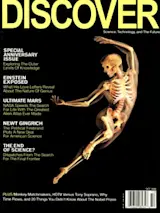Researchers at Boston's Brigham and Women's Hospital announced this week that a laser scan for the eyes has so far been 100 percent accurate as an early detector for Alzheimer's disease in mice.
"This is proof-of-concept evidence for early detection. It says that we're on the right track," lead researcher Lee Goldstein says. Goldstein's team used the laser scan eye test to compare mice that were genetically engineered to develop Alzheimer's with normal mice.
The laser scan found beta-amyloid protein in the eyes of the Alzheimer's mice well before any evidence was shown in the brain. In Alzheimer's patients the beta-amyloid protein ultimately builds up into plaques between nerve cells in the brain.
The laser directs a low-intensity beam of light into the lens of the eye, which bounces off of specific particles, similar to how the sun's light bounces off particles of water in clouds. This produces a "scatter ...














